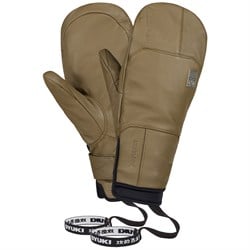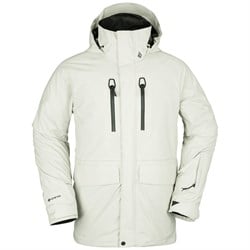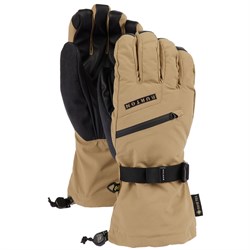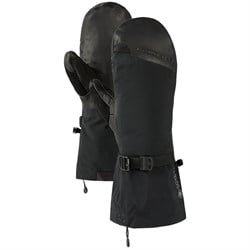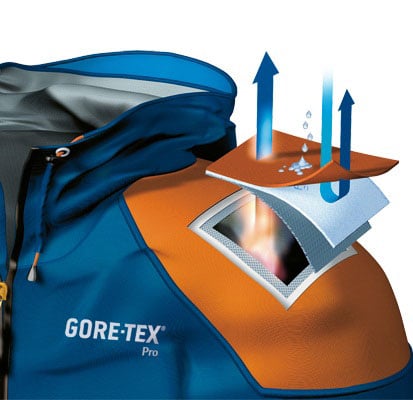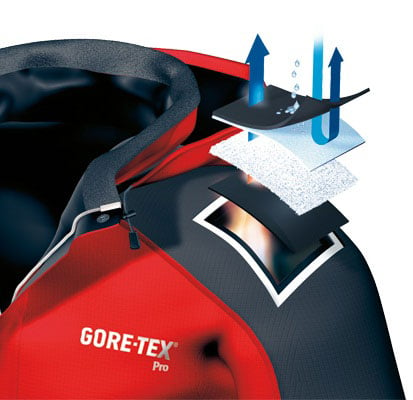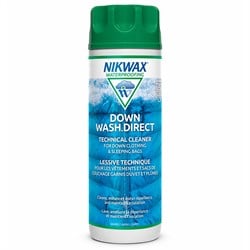How Waterproof & Breathability Ratings Work
Contents
Fabric Waterproof Ratings
Click your preferred waterproof rating to shop
| Waterproof Rating (mm) | Water Resistance Provided | Conditions |
|---|---|---|
| 0-5,000 mm | No resistance to some resistance to moisture. | Very light rain, dry snow, no pressure. |
| 6,000-10,000 mm | Rainproof and waterproof under light pressure. | Light rain, average snow, light pressure. |
| 11,000-15,000 mm | Rainproof and waterproof except under high pressure. | Moderate rain, average snow, light pressure. |
| 16,000-20,000 mm | Rainproof and waterproof under high pressure. | Moderate rain, wet snow, some pressure. Think PNW. |
| 20,000 mm+ | Rainproof and waterproof under very high pressure. | Heavy rain, wet snow, high pressure. |
What do Waterproof Rating Numbers Mean?
Manufacturers typically describe the waterproof and breathability ratings of fabrics using two numbers, often separated by a backslash. The first number is waterproof, the second is breathability. The origins of these ratings are in a scientific lab, (described below) not the outdoors, but the bottom line is simple - the higher the rating, the more waterproof, and the more breathable the jacket or garment is.
How are Waterproof Ratings Determined?
Waterproof ratings are determined by the clothing manufacturer or fabric producer, with testing done either by independent laboratories or in-house. There are a number of different testing protocols in use, but most involve the equivalent of placing a 1” x 1” square tube over the fabric and determining how high (in millimeters) a column of water you can suspend over it before it starts to leak. Some manufacturers have developed their own testing methods that involve adding pressure to the process to simulate the effects of wind.
While waterproof ratings are becoming more standardized, remember that different labs may test or report differently, and may come up with different results even with two pieces of fabric from the exact same roll, so take the numbers with a grain of salt. Keep in mind that some manufacturers report waterproof ratings in PSI (Pounds per Square Inch) rather than millimeters, which has a conversion rate of 704 mm = 1 PSI.
How are Breathability Ratings Determined?
Like waterproof ratings, breathability ratings are determined by both manufacturers and independent labs, but the testing methodologies are quite diverse and almost impossible to compare with each other.
Results can vary wildly based on test, temperature, humidity and pressure and are not standardized from brand to brand, or test to test. Most testing doesn’t reflect real world winter conditions, like near freezing outside temperatures with high relative humidity. Since manufacturers seldom reveal the actual test used, and are probably keen on reporting the highest possible figures to promote sales, it’s best to read these numbers with the eye of a skeptic, but generally within a given brand or family of fabrics it’s safe to say more grams is more breathable (if a company grades breathability on an RET scale – Resistance to Evaporative Heat Transfer – a lower value is better).
How Breathable a Garment do I Need?
You can get away with a low breathability garment if you aren’t going to work up much body heat or maybe you won’t be out and about for too long. Higher breathability helps for active uses like running, and the ski touring & splitboard crowd to avoid quick wetout inside their layers caused by their own physical exertion. So, you'll want to look out for breathability in your ski jacket, but it might not be important if you're just wearing it around town.
If you're looking for a snowboard jacket, your riding is lift-served, you don’t hike to out-of-the-way lines, and you take regular breaks in the lodge where you remove your coat, a breathability rating of 5,000 to 8,000 grams will probably be fine. This goes for more casual uses, too.
If you do a lot of “high energy” riding, hiking, or running where you often break a sweat, look for breathability in the 10,000 to 15,000 gram range. Backcountry skiers & snowboarders, runners, and mountain bikers should look for garments with breathability in the 20,000 plus range for the best results.
There are times when a layer of warm, moist air between your body and your shell can mean warmth as long as your underlayers don’t become saturated with moisture. In cold and dry weather, a super breathable shell can actually lead to visible clouds of water vapor exiting the wearer’s body, which leads to heat loss. It’s not uncommon for owners of eVent™ jackets, for instance, to need more insulation under their shells to stay warm.
How Waterproof a Garment do I Need?
Jackets and clothing with lower waterproof ratings are better suited for fair weather, low-moisture activities. Clothing and gear with higher waterproof ratings are ideal for people who need gear that will perform when the weather turns sour. People who wear backpacks often may also want to consider outerwear with higher waterproof ratings as the straps put pressure on the jacket and may force moisture through gear that has a lower waterproof rating. An intense, high-exertion day of activity in wet conditions with the added pressure of wind, sitting, and falling can put even the best-rated waterproof fabrics to the test.
We recommend a minimum waterproof rating of 5,000 mm, or 5k, for ski and snowboard jackets and snow pants. If you ride primarily in cold and clear conditions and take regular lodge breaks, this level of protection could be fine, but anything less and you stand a good chance of getting wet and cold in a storm. Clothing rated between 5,000 mm and 10,000 mm (10k) is a good choice for riders who spend long days out and ski or snowboard in any weather conditions. Avid skiers and snowboarders, especially those in wetter climates, should look for waterproof ratings in the 10,000 mm to 20,000 mm range or better. If you spend a good percentage of your time in the backcountry or hiking or skinning to remote locations, breathability becomes equally as important as waterproofing – look for outerwear with both waterproofing and breathability in the 20,000 plus range. As you might expect, higher ratings in both categories will usually mean higher prices. It is money well spent.
Why Isn’t Outerwear Completely Waterproof?
To put it simply, you probably wouldn’t want to ride in it if it was. A rubber raincoat is completely waterproof, and may be the ideal garment for standing in a downpour waiting for the bus, but if you tried to ski or snowboard in it, you’d be wet in no time from your own perspiration even on a sunny day. The trick to a good active shell is protection from rain and snow on the outside with the ability to let water vapor (warm perspiration) escape from the inside.
All outerwear designed for active use has degrees of water resistance, but will eventually leak given enough water, time and pressure. Manufacturers define “waterproof” according to different standards, and testing is not standardized.
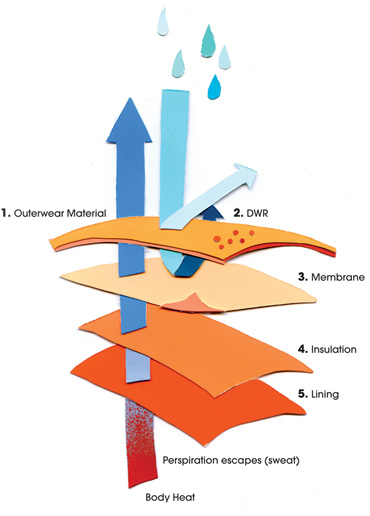
How Do They Make Fabric Waterproof & Breathable?
Waterproof breathable fabrics consist of an outer layer called the “face fabric”, usually made of nylon or polyester, and a laminated membrane or coating, made of PTFE (Polytetrafluoroethylene) , PU (Polyurethane), or more recently PE (Polyethylene). The purpose of the face fabric is to protect and look stylish; it’s not waterproof but is treated with a solution called DWR (Durable Water Repellent) so it doesn’t soak up water. Sometimes a layer of insulation is added for warmth.
The job of keeping the water out is left to the membrane, which has tiny holes too small to let liquid water enter but large enough to allow water vapor to escape. Since contamination with oil, sweat and chemicals can cause membranes to lose their ability to keep out water, the membrane is protected by an ultra-thin layer of Polyurethane (GORE-TEX membranes have a bi-component laminate structure) or other oleophobic (oil-hating) treatment (eVent™ does this at the microscopic level with individual PTFE fibers). Finally, a fine scrim or mesh is bonded to the inner surface for comfort in 3 Layer (3L) fabrics. 2 Layer (2L) fabrics receive a separate fabric liner, while 2.5 Layer fabrics use an abbreviated pattern screened on the inner surface to save weight. Modern waterproof breathable fabrics have come a long way since the original GORE-TEX, and most are extremely waterproof at any price point, but outstanding gains in breathability in the past few years have redefined the market in high exertion outerwear.
To learn more about outerwear including fabrics and features, check out our Outerwear Construction Guide.
Membrane or Coating?
Waterproof breathable fabrics with ePTFE membranes have dominated the market for years but are being phased out due to environmental concerns and legislation. As of 2024, GORE-TEX will replace ePTFE in its consumer fabrics with ePE (expanded Polyethylene). Other companies are also pivoting to Polyurethane, Polyethylene and Polyester membranes in the search for more environmentally sustainable solutions.
Membranes come in many different types and price ranges, but chances are you'll want a 2 Layer or 3 Layer fabric with a laminated membrane if you're looking for a versatile and durable snow garment. 3 layer fabrics (3L) have all the layers including the lining bonded together, while 2 layer fabrics use a separate fabric lining which makes for a bulkier garment overall. 2.5 layer fabrics have a raised pattern screened on the inside to keep it off your skin and are usually reserved for superlight rain garments.
Coated fabrics tend to be very waterproof but lack breathability in comparison to membrane laminates. These fabrics are less expensive and are improving as manufacturers finds ways to make the coatings thinner and more porous. Coated fabrics are great for emergency weather protection or for activities that don't involve a high level of exertion.
What is Seam Sealing and Why is it Important?
Seam sealing, sometimes referred to as seam taping, covers the tiny holes made by the needle in the sewing process so they don’t leak, using a heat application of thin waterproof tape. Sometimes seams are bonded together using glue or heat, but typically they are first sewn then taped. Jackets, pants, and other outerwear can be either “fully taped” or “critically taped” – the difference is that a fully taped garment has every seam taped, while a critically taped one has tape only on high exposure areas like the neck, shoulders, and chest. Without adequate seam sealing you’ll get wet even with the best waterproof/breathable fabric.
What is Durable Water Repellent or DWR?
DWR stands for Durable Water Repellent. It is the DWR treatment that keeps the outer layer of your fabric from getting soaked by precipitation. Almost all outerwear exterior fabrics are treated with some sort of DWR. The treatment is meant to keep the fabric from becoming saturated with water which can make the fabric feel heavier, colder, and impacts its performance.
DWR causes water to bead-up and roll off the fabric and is affected by abrasion, dirt and body oils. Falls on the mountain, rubbing against your pack or the chairlift, and normal use can cause the factory DWR treatment to wear off. This is why, after some use, a garment will appear to no longer be waterproof.
It likely means the fabric needs to be refreshed by smiply washing the garment, re-applying the DWR treatment, or both. Aftermarket DWR treatmens in roll-ons, sprays, and wash-ins are available from companies like Nikwax to re-condition your waterproof/breathable garment after washing. Try a fresh DWR coat if you notice water soaking into the face fabric of your Waterproof/Breathable garments and you have already attempted to refresh the DWR by cleaning your outerwear.
DWR sprays are best applied to a damp garment after washing and thoroughly rinsing it (do a second rinse cycle without soap before you apply the DWR to make sure no detergent residue remains) and should be heat activated using a medium dryer before use. Read the directions on both your garment and the DWR bottle before you start. We recommend spray DWR products rather than wash-in products, which deposit DWR on the interior of the garment as well as the face fabric and may interfere with the functionality of the membrane.
Note: Laws and regulations governing the use of DWR solutions continue to evolve, spurred by efforts on the part of the European Union and states like California to reduce the amount of PFAS (Perfluoroalkyl) chemicals being released into the environment. Originally, most DWR solutions were very effective "long chain" C8-based (8 carbon atoms in the molecule), but these have been largely banned worldwide due to the toxic "forever chemicals" they leave behind. C8's were replaced by C6 DWR formulas, but these too leave non-degradeable toxic compounds in their wake and are now being phased out in many parts of the world.
What is GORE-TEX
GORE-TEX fabrics are created by laminating a GORE-TEX membrane to high performance nylon and polyester face fabrics. They come in several different grades, including GORE-TEX Pro, GORE-TEX Active, as well as just regular GORE-TEX and GORE-TEX INFINIUM™. GORE also offers soft shell fabric and a super light 2.5L fabric called Paclite. GORE-TEX garments are fully seam sealed and feature a “GUARANTEED TO KEEP YOU DRY®” promise.
Although many laminates are waterproof, a GORE-TEX membrane is capable of maintaining an extremely high level of waterproofness while staying very breathable thanks to billions of microscopic pores that let water vapor out and prevent liquid water from entering. W.L. Gore works hard to develop and refine waterproof breathable technology.
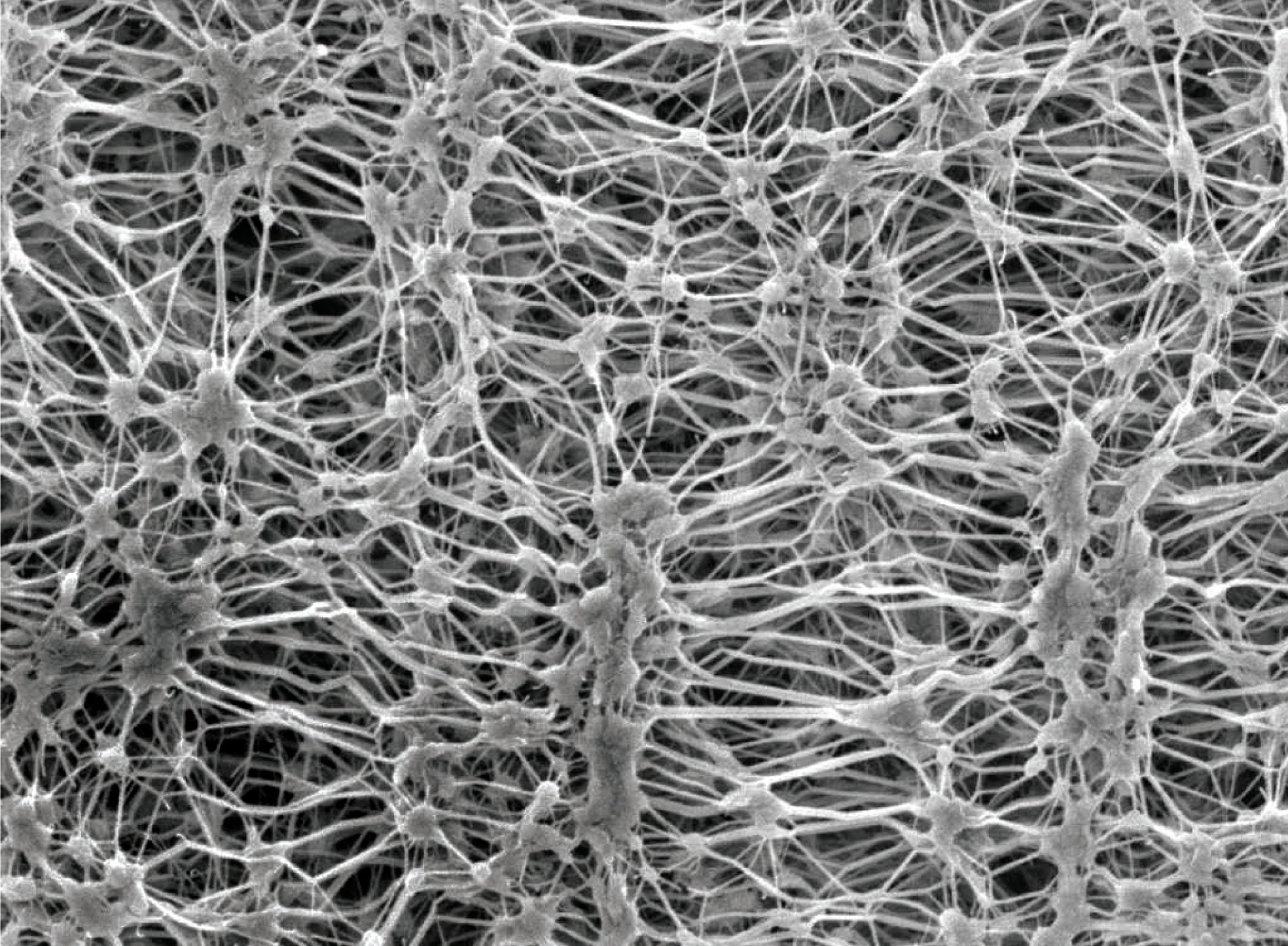
Electron microscope photography of GORE-TEX membrane
Introduced in 2013, GORE-TEX Pro fabrics utilize a new membrane with no Polyurethane protective layer and significantly improved breathability. In 2015, GORE introduced a new backer technology for 3 layer GORE-TEX fabrics called C-KNIT™ which uses a very fine nylon backer with a circular weave. C-KNIT™ fabrics also have improved breathability, a softer hand, and slide over mid layers more easily. GORE has also launched the GORE-TEX INFINIUM™ line of products for when comfort and performance matter more to you than total waterproofness.
In late 2021, W.L. Gore introduced a new membrane technology based on ePE (Expanded Polyethylene) rather than their traditional ePTFE. Designed for long-term sustainability, the ePE membrane uses no perfluorochemicals (PFC’s) in its production and features performance very similar to other GORE-TEX fabrics, with exceptional waterproof performance and durability. Because of the ePE membrane’s strength, fabrics are expected to last longer and can be made thinner and more packable. Expect ePE GORE-TEX fabrics to gradually replace ePTFE fabrics beginning in 2022-2023.
While some people refer to all waterproof/breathable fabrics as “GORE-TEX,” it’s a proprietary product and technology of the W. L. Gore Corporation. For more information on the GORE-TEX family of products, check out our GORE-TEX Guide.
Other Waterproof Breathable Brands
The outdoor fabric industry is currently experiencing a surge in new product development that competes directly with GORE-TEX. Products like eVent™, Polartec® Neoshell®, Pertex® Shield and Mountain Hardwear Dry.Q Elite are extremely waterproof and also push the envelope on breathability. Use of very thin Polyurethane and Polyester membranes is also expanding, with much of the innovation coming from Asia – these fabrics have the advantage of not requiring a separate layer to protect the ePTFE membrane from contamination, and are catching up in the breathability department.
Here’s a partial list of waterproof breathable fabrics and technologies and the companies they’re associated with:
- eVent®
- Fabric and technology used by multiple companies: oleophobic protective solution is applied at a microscopic level to the PTFE fibers and nodes, allowing the membrane to maintain its natural microporous and air permeable structure. eVent fabrics complete line of waterproof products (ranging from 10,000-30,000 mm) feature the company’s Direct Venting technology, a proprietary air permeable waterproof system that delivers outstanding breathability combined with windproof protection.
- FUTURELIGHT™
- A proprietary technology from The North Face, FUTURELIGHT™ relies on a “nano-spun” polyurethane membrane created using thousands of moving nozzles, and features exceptional breathability compared to other waterproof breathable products. Introduced in 2019, FUTURELIGHT™ is designed for use in high-exertion situations like climbing and backcountry touring.
- MemBrain®
- Marmot's proprietary waterproof breathable fabric with a PU membrane features excellent performance at reasonable prices.
- Polartec® NeoShell®
- Fabric used by multiple companies: very supple and slightly stretchy fabric with a reported waterproof rating of ~10,000 mm and ground-breaking breathability. Unique membrane allows two-way air exchange to facilitate water vapor evacuation. Cold weather endurance athletes who require exceptional breathability are stoked about this fabric.
- Polartec® Power Shield® Pro
- A highly breathable soft shell fabric that’s waterproof enough to wear most of the time in dryer mountain climates.
- Dry.Q™ Elite
- Mountain Hardwear’s proprietary W/B fabric . By eliminating the thin continuous PU layer over the PTFE membrane, this technology allows the user to vent water vapor as soon as the garment goes on, without a buildup of moisture and heat.
- DryVent® (Formerly Hyvent®)
- Waterproof/breathable fabric from The North Face available in several different models. TNF™ gives waterproof ratings in PSI (Pounds per Square Inch); DryVent® 3L, for instance, is rated at 25 PSI minimum after 20 washings with a breathability rating of 750-800 g/m2/24 hrs avg (MVTR) Upright Cup. (Keep in mind that Upright Cup numbers for a given fabric are typically much lower than those from other testing methods).
- H2No®
- Patagonia’s proprietary W/B fabric, offered in 3L, 2L, and 2.5L versions. Patagonia also offers a full line of GORE-TEX® garments.
- PreCip™
- A coated technology exclusive to Marmot that offers great value in lightweight rainwear.
Pertex® Shield+ / AP
Pertex Shield+ is the ultimate lightweight, waterproof fabric for fast moving outdoor activities. It uses a hydrophilic PU membrane to provide a high level of dynamic breathability – the harder you work the greater the breathability of the fabric.
Pertex Shield AP features an advanced air-porous membrane to offer the highest levels of durability and performance for professional and extreme applications. Pertex Shield AP contains a high concentration of uniformly spaced microporous holes that have highly hydrophobic properties. This membrane plays a dual role, giving the fabric both its waterproofness and a high degree of moisture permeability.
Dermizax™
Developed by Toray, Dermizax™ is a sophisticated moisture-permeable waterproof woven fabric with a non-microporous polyurethane membrane. It is stretchable and offers high levels of water resistance, breathability, and fabric elasticity.
Learn More With Our Other Outerwear & Layering Guides:
- Waterproof Ratings & Breathability Guide
- Skiing & Snowboarding - What to Wear Skiing & Snowboarding
- Outerwear - How to Choose a Ski & Snowboard Jacket
- Outerwear - How to Choose Ski & Snowboard Pants
- Outerwear - Fit Guide & Jacket Length
- How to Wash Waterproof Jackets & Clothing
- Outerwear - How to Choose by Region
- Outerwear - Construction, Fabric & Features
- Insulated Garments - How to Choose
- Insulated Garments - How to Wash Down & Synthetic Jackets
- Base Layers & Long Underwear - How to Choose
- GORE-TEX® Fabric - How it Works & Product Testing
- GORE-TEX® Fabric - How to Wash & Keep Waterproof
- Backcountry - How to Dress
Learn About Our Favorite Gear
- The Best Men's Ski Jackets
- The Best Women's Ski Jackets
- The Best Men's Snowboard Jackets
- The Best Women's Snowboard Jackets
- The Best Kids' Ski & Snowboard Jackets
- The Best Men's Ski Pants
- The Best Women's Ski Pants
- The Best Men's Snowboard Pants
- The Best Women's Snowboard Pants
- The Best Men's Ski Bibs
- The Best Men's Snowboard Bibs
- The Best Women's Ski Bibs
- The Best Kids' Ski & Snowboard Pants
- The Best Men's Down & Puffy Jackets
- The Best Men's Ski & Snowboard Mid Layers
- The Best Men's Ski & Snowboard Base Layers
- The Best Women's Snowboard Bibs
- The Best Men's Fleece Jackets
- The Best Women's Down & Puffy Jackets
- The Best Women's Fleece Jackets
- The Best Men's Rain Jackets
- The Best Women's Rain Jackets
- The Best Men's Hardshell Jackets
- The Best Women's Hardshell Jackets
- The Best Women's Ski & Snowboard Mid Layers
- The Best Women's Ski & Snowboard Base Layers
- The Best Down Vests
- The Best Kid & Toddler Snowsuits
This is evo. We are a ski, snowboard, wake, skate, bike, surf, camp, and clothing online retailer with physical stores in Seattle, Portland, Denver, Salt Lake City, Whistler, and Snoqualmie Pass. Our goal is to provide you with great information to make both your purchase and upkeep easy.
evo also likes to travel to remote places across the globe in search of world-class powder turns, epic waves, or legendary mountain biking locations through evoTrip Adventure Travel Trips. Or, if you prefer to travel on your own, check out our ski & snowboard resort travel guides and mountain bike trail guides.
Still have questions? Please call our customer care team at 1.866.386.1590 during Customer Care Hours. They can help you find the right setup to fit your needs.
